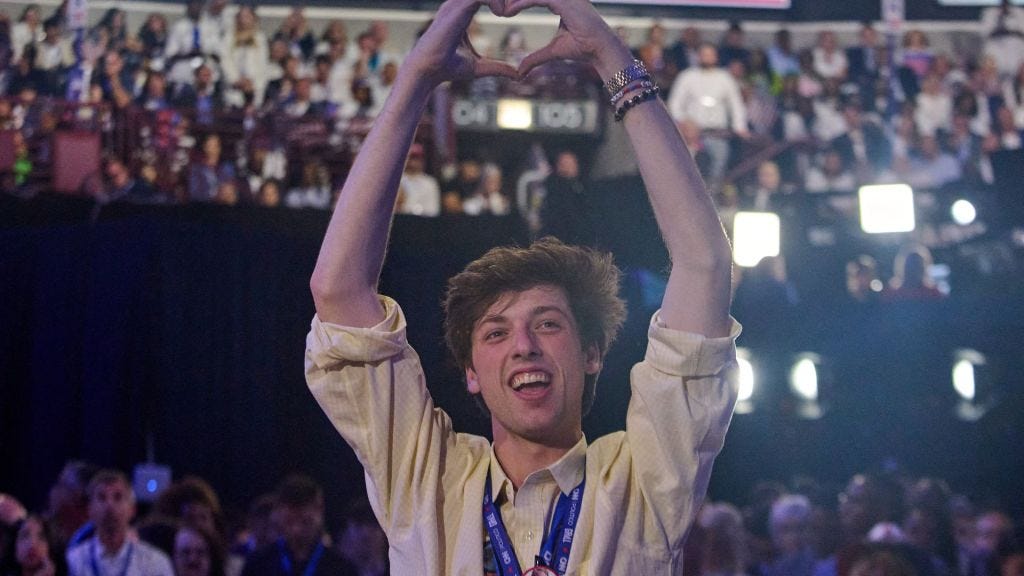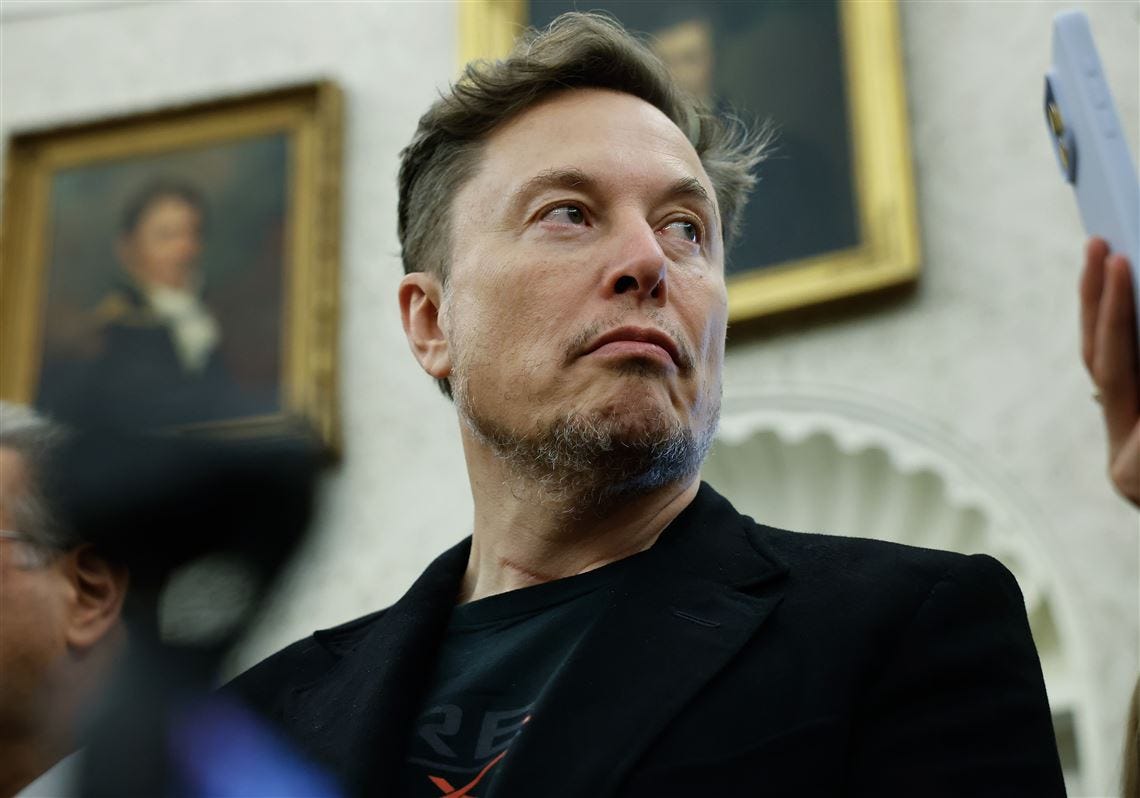Dems Drop $20M Finding "The Next Rogan," Republican In-Fighting Over Pesticides, Musk and Trump Relationship Over? EV's Out...V8's are Back? (The Five for 05/28/25)
Hey, welcome to The Five, a publication about the stories that matter, but don’t always make the front page.
Let’s dive into the news.
[one]
The Trump administration in particular, and Republican lawmakers (and voters) in general, may experience a deep split around agriculture pesticides.
On Thursday, RFK released the highly anticipated MAHA Commission report, which detailed a variety of potential causes of the childhood chronic illness epidemic. Though the report takes on pesticides — its authors order a study on the chemicals by next year — there’s a clear effort by RFK and his top allies to quell fears of quick regulatory action.
“American farmers rely on these products, and actions that further regulate or restrict crop protection tools beyond risk-based and scientific processes set forth by Congress must involve thoughtful consideration of what is necessary for adequate protection, alternatives, and cost of production,” the report states.
This effort has been in the works since before the report. Top RFK advisor Calley Means signaled last week that while the report will state the “truth” about pesticides, HHS has no desire for “nanny state” regulatory measures on pesticides, especially since abrupt action could spell a “disaster.”
“This report is on the truth, it’s on the dynamics. It’s a fact that we ingest 25% of the world’s pesticides in the United States, and many of our leading pesticides, in other countries across the world, have chosen to phase them out or ban them, calling them carcinogenic and disruptive to kids. Those are the facts. Those are easily Google-able. The United States government has never recognized those facts,” Means said. “When you get to policy, and I want to make this clear: I don’t think anyone in the Trump administration, I don’t think it’s the right policy, to say that insinuates that we need to have some sort of European anti-growth regulatory nanny state.”
“The policy solutions from this are not obvious,” he continued. “Pesticides are deeply ingrained into the U.S. agricultural system and it would be a disaster to phase them out tomorrow. Nobody is suggesting that.”
Means also noted that throughout the 2024 campaign, Trump said he wants “the truth” on pesticides, seeming to downplay pushback from the White House.
Observations:
A). Full disclosure, I worked in agriculture marketing…and I’ve been told by roughly a dozen farmers that Roundup (Glyphosate) gave them cancer. Also, my own family uses Roundup.
Oh, and a large portion of the readership of The Five are farmers, so this may be the most divisive topic of 2025 for this publication.
B). As I’ve previously written in The Five, I believe Calley and Casey Means are frauds (Casey didn’t finish Residency, Calley isn’t anything) with no place in government.
C). To quote the musical Hamilton “winning is easy, young man. Governing is harder.” Republicans run everything right now…and Republican voters are DEEPLY divided over this issue. Before this is all over, I could see this issue fracturing the Republican party like no other topic in politics.
[two]
Well, now that I’ve insulted the Republican party, lets go ahead and knock the absurdity on the other side of the aisle.
From The Spectator:
Who will be the Democratic party’s Joe Rogan? That is the $20 million question facing the party, as Democrats try to recover from the last election, when the podcasters had the power.
Setting aside Rogan’s status as a longtime backer of both the Democrats and Bernie Sanders, the party’s plan to win back heterosexual, cisgender young men reads like a Barnard gender studies thesis.
The plan’s codename, SAM, stands for “Speaking with American Men: A Strategic Plan” and sets out to “study the syntax, language and context that gains attention and virality in these spaces.” Some free advice from Cockburn: normal young men don’t use words such as “syntax” in their everyday speech.
Possible Rogan replacements bandied about include Hasan Piker – who was recently suspended from Twitch for violating the platform’s policy about handling propaganda content from terrorists after he discussed the manifesto of the Capital Jewish Museum shooter. Brian Tyler Cohen and the MeidasTouch network are also on the list. Not exactly a fair fight.
The Democrats aren’t just searching for who should talk about the country, but also who should run it. Politico magazine’s Bill Scher rolled out a potential shadow cabinet for 2028 that includes a comedian as a “shadow administrator of the Small Business Administration,” the recently fired director of the National Intelligence Council as a “shadow director of national intelligence” and the Mayor of Nashville who is under investigation for abetting illegal immigrants, as a “shadow secretary of transportation.”
Samantha Power as a shadow Secretary of State isn’t exactly the A-team, given that she is best-known for running USAID – an agency that has seen better days.
If the Democrats want to reach normal young men, Cockburn thinks they should turn to Hunter Biden. His affinity for sex, drugs and rock ’n’ roll would resonate more with “the fellas” than most of their milquetoast podcasters.
Observations:
A). The idea that you can “buy” a Joe Rogan is absurd. Joe Rogan became the biggest podcaster in the world by…starting out as one of the first podcasters in the world. He only has on guests who interest him. The show has next to no social media. It’s a truly personal experience between Rogan and his die hard fans.
You don’t buy a Joe Rogan with money…you build one.
Of course…that takes 20 years.
B). Maybe the Dems should be more concerned about winning back the Joe Rogan who’s already Joe Rogan.
C). Yeah, I don’t think Hunter Biden is the answer to any question worth asking.
[three]
US aid into Gaza turned out thousands of people…in a scene that may (or may not) have turned deadly…depending on which side you believe.\
Reuters reports:
Thousands of Palestinians on Tuesday rushed an aid distribution site in Gaza operated by a foundation backed by the United States and Israel, with desperation for food overcoming concern about biometric and other checks Israel said it would employ.
The Gaza Humanitarian Foundation said it had distributed about 8,000 food boxes, equivalent to 462,000 meals, after an 11-week Israeli blockade of the war-devastated enclave.
In the southern city of Rafah, which is under full Israeli army control, thousands of people including women and children, some on foot or in donkey carts, flocked towards the foundation's distribution sites to receive food packages.
Videos, some of which Reuters could not immediately verify, showed lines of people walking through a wired-off corridor and into a large open field where aid was stacked. Later, images shared on social media showed large parts of the fence torn down as people jostled their way onto the site.
Israel and the GHF said, without providing evidence, that Hamas, Gaza's dominant militant group, had tried to block civilians from reaching the aid distribution centre. Hamas denied the accusation.
Later on Tuesday, the Hamas media office accused the Israeli military of killing at least three Palestinians and wounding 46 others near one of the distribution sites, while seven people remained missing. A GHF spokesperson said the information from Hamas was "totally false."
The foundation said at one point on Tuesday the number of people seeking aid was so great that its team had to pull back to allow people to "take aid safely and dissipate," and to avoid casualties. It said there were no casualties, no one opened fire and normal operations later resumed.
There has been no immediate Israeli comment on the allegation by Hamas. Earlier, the Israeli military said its troops fired warning shots in the area outside the compound and that control was re-established.
A U.N. spokesperson called images of the incident "heartbreaking."
[four]
Another sign that the relationship between President Trump and tech billionaire Elon Musk is fracturing…Musk had cutting words for Trump’s budget.
The billionaire entrepreneur, who supported Trump’s candidacy with at least $250 million and has worked for his administration as a senior adviser, said he was “disappointed” by what the president calls his “big beautiful bill.”
The legislation includes a mix of tax cuts and enhanced immigration enforcement. While speaking to CBS, Musk described it as a “massive spending bill” that increases the federal deficit and “undermines the work” of his Department of Government Efficiency, known as DOGE.
“I think a bill can be big or it could be beautiful,” Musk said. “But I don’t know if it could be both.”
His CBS interview came out Tuesday night. White House officials did not immediately respond to questions. Republicans recently pushed the legislation through the House and are debating it in the Senate.
Musk’s comments come as he steps back from his government work, rededicating himself to companies like the electric automaker Tesla and rocket manufacturer SpaceX. He’s also said he’ll reduce his political spending, because “I think I’ve done enough.”
[five]
And finally, the future of EV’s in the U.S. continues to be…confusing. Some numbers point to a trajectory of EV growth…while others…show that Americans really just wnt big trucks and SUVs. General Motors is responding to the latter market with their latest plant, focused on V8 engines.
From Car and Driver:
General Motors has heavily invested in electric vehicles. Over the past couple of years, it has launched everything from the affordable Chevy Equinox EV to the luxurious Cadillac Escalade IQ to the Chevy Silverado EV truck. But GM isn't giving up on internal-combustion engines either, as yesterday it announced that it will be investing $888 million in the production of a new generation of V-8 engines.
The sixth generation of GM's small-block V-8 is due to start production in 2027 and will continue to be built at the Tonawanda Propulsion plant in Buffalo, New York. The $888 million investment into the facility will bring new machinery and tools for producing the next iteration of the V-8, as well as renovations to the factory, GM said in a statement.
General Motors says the next-generation V-8 that will be built at Tonawanda will be used for full-size trucks and SUVs, and the timeline of production starting in 2027 aligns with the expected arrival of a next-generation Silverado and GMC Sierra trucks. GM's next-generation full-size trucks will be followed shortly thereafter by new versions of the Chevy Suburban and Tahoe, GMC Yukon, and Cadillac Escalade, all of which were refreshed for the 2025 model year.
GM says it expects the new engines to improve performance while reducing emissions and becoming more efficient. The investment in the Tonawanda facility follows a $500 million investment in the Flint Engine plant from 2023, which is also dedicated to the production of the sixth-generation V-8.
Until the next one,
-sth







